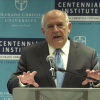Historically, state fairs are exhibits of a region’s agricultural prowess. The best and biggest livestock and produce, deep-fried wonder foods, and the carnival atmosphere provide a festive bookend to the growing season. The Colorado State Fair is no different, and part of its annual spectacle was Friday’s Legislative BBQ, drawing a bipartisan cast of elected officials to Pueblo for networking and fellowship.
“The legislative barbecue is a great thing,” said Rep. Ty Winter (R-Las Animas County). “You get to talk to people of all different stripes here. It’s an enjoyable experience away from the Capitol sometimes when we’re constantly beating each other up to actually shake hands and try to have a civil conversation.”
Republicans in Colorado’s legislature are a minority, and this past legislative session featured contentious debates over legislation related to abortion and gun control. Winter’s appreciation of the Legislative BBQ’s bipartisan character is not shared by all members of his caucus. Saturday, in Monument, Rep. Scott Bottoms (R-Co Springs) told the audience of Proposition HH town hall, “At the end, you have all of this pomp and circumstance [at the end of the session], like we’re all these people that are getting along and playing games together,” he said. “We’re not. We are enemies of those people, and they are destroying our state.”
According to Winter, rural conservatives are bearing the brunt of Democratic policy agendas. “The policies that are enacted at the state capitol are affecting us,” said Winter. “It’s taking jobs out of our district. It makes it tough. I live in Los Animas County. We were one of the biggest oil and gas counties in the state of Colorado, and I’ve seen numerous families be split apart because they have to move to Texas, Oklahoma, North and South Dakota to find work to feed their families. I think the misconception is, is that people in rural Colorado, we don’t care about the climate, we don’t care about water, we don’t care about blue skies, but we’re the true stewards of the land. If you look at what our property looks like compared to what the urban jungle looks like, the concrete jungle, I would say that we’re doing a pretty good job of keeping our skies blue and, you know, our grass growing and it beautiful. I think that rural Colorado and farmers and ranchers don’t get enough credit for being true stewards of the land.”
The Democrats in attendance at the Legislative BBQ were also mindful of the needs of rural Coloradans. “I grew up in Minnesota and the Minnesota State Fair was always the end-of-summer highlight,” says Adam Frisch, who has traveled over 8,000 miles in his latest bid to unseat U.S. Rep. Lauren Boebert (R-CO). ”The two biggest issues I hear from ranchers and farmers — one is obviously the water conversation. Who do you want sitting down in that chair where there could be eight of us from Colorado and 52 people from California?” he said, referring to difference in size between the states’ congressional delegations. “Who do you want sitting in that chair in a bipartisan manner talking about very complicated issues that are fundamental to the state’s economy and heritage? The second other issue is the shortage we have in the labor pool, whether that’s in these small towns or on the ranches and farms. We need to make sure that we protect our borders, at the same time, making sure we have a legal immigration process to make sure that the farmers can produce the agricultural needs and goods that they have that the whole country uses.”


While Boebert also attended the event, her staff declined an interview request from the Colorado Times Recorder.
U.S. Sen. Michael Bennet (D-CO) touted his accomplishments on behalf of rural Colorado. “We’re going to fully fund the Arkansas Valley conduit, which has been promised by Jack Kennedy in 1960, in Pueblo,” he said. “Because of the bipartisan infrastructure bill, we got an additional $150 million. That’s now going to be finished in the next five years, so people in the Arkansas Valley who spent generations fighting for this are finally going to have won that. … there’s $4 billion that we were able to get in the Inflation Reduction Act, for what I hope will be a largely permanent reduction in the lower basin of the Colorado River.”

Aside from pressing concerns about water in drought-prone Colorado, Bennet also highlighted efforts to bring high-speed internet to underserved rural areas. “The broadband bill provisions that I wrote with the Delta Montrose Electric Association, broadband provisions of the infrastructure bill, they’re going to have a huge effect on rural Colorado,” said Bennet. “We’re getting $830 million to build broadband, and a lot of that is going to be in rural areas and it’s going to mean that young people won’t have to do their homework in Wal-Mart parking lots.”
Despite successes with infrastructure, federal protections for abortion and LGBTQ people remain out of the Democrat’s reach. “I think it’s really, really important, in the wake of Roe v. Wade being overturned, to be leading the fight to enshrine a woman’s right to choose as a matter of our national policy,” said Bennet. “We’re going to have to elect a pro-choice Congress to do that. It won’t pass now. I think with the right votes in the House and the right votes in the Senate, we’ll be able to do it.”
Frisch hopes to be one of those votes. “It’s sad that we have someone running that is in that 8% or 10% of the country that does not want to allow women to make their own health care choices, even in the cases of rape, incest and the life of the mother,” he said. “To me, time and time again, this is about making sure that women have the chances to live their lives as they want. We don’t want the government in any part of that doctor’s process, in the waiting room, in health care. I think health care freedom, especially women’s health care, reproductive rights, is super important. I just think it should be left to the family members and the doctors to make those decisions.”
While the issue of abortion access has been decided in the Colorado legislature, Republicans like Winter and Bottoms will continue their opposition next session, despite the camaraderie of the Legislative BBQ. “At the end of the day, I’m going to represent my constituents the way that they want me to represent them,” said Winter. “I think what gets lost at the Capitol a lot of time is, is they separate the representative from their constituents. I believe I was elected to represent the will and what my constituents would like me to do. I was elected based on a set of values, and I believe that I represented my constituents with that. As long as they keep sending me up here, I’m going to be in the fight that they want me to do.”




